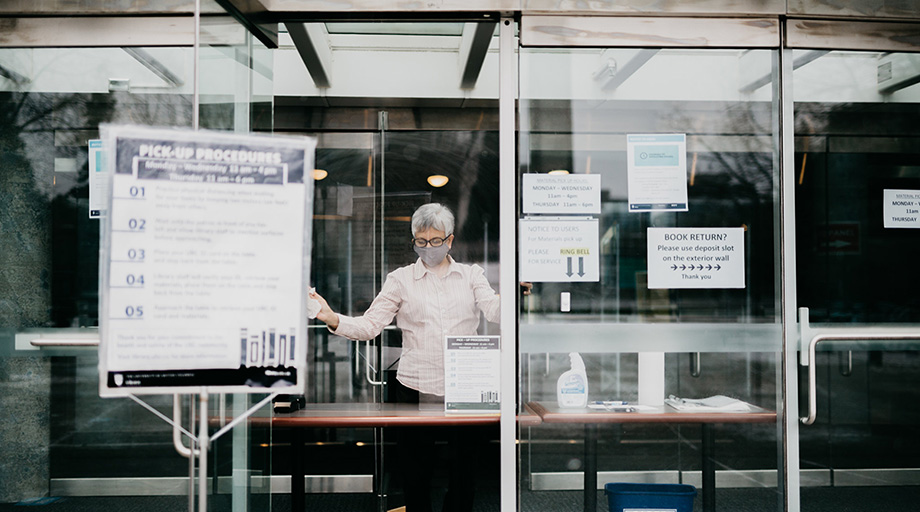This post was originally published by the University of British Columbia Library.

It’s been over a year since the UBC community transitioned to remote teaching, learning and research due to the COVID-19 outbreak, and UBC Library continues to adapt its spaces and services to accommodate the needs of students, faculty and staff.
Creating the Materials Pick-up Service
When UBC Library’s physical locations suddenly closed in March 2020, access to the library’s physical collections became difficult, if not impossible. Electronic access to the collections was expanded through the library’s participation in the HathiTrust Emergency Temporary Access Service, but library users still needed a way to access physical resources that were not available in electronic formats. In response, the Materials Pick-up Service launched in July 2020.
Through the service, library users send their requests using the online library catalogue. Requests are processed within seven business days and held for two weeks at the main entrance to Koerner Library on UBC Vancouver campus and in designated lockers in the Commons building on UBC Okanagan campus.
“Safety has been our first priority in setting up this service,” says Aleteia Greenwood, Associate University Librarian. “We wanted to ensure that any library staff working on the Materials Pick-up Service are protected, feel comfortable and supported in their roles, and that library users who use the service can do so safely.”
In total, more than 18,860 requests have been filled since the service launched. Materials in the Humanities and Social Sciences collection, in particular, have been in high demand, accounting for 43% of all requests submitted.
“Once the service was up and running, the hardest challenge was keeping up with the demand,” recalls Shauna Barry, Manager of Borrower Services at Koerner Library. “The Materials Pick-up Service started with a limited staff, and it was all we could do to keep up with processing the requests, retrieving the items and getting them ready for pick-up.” By November, the library was able to increase staffing levels to keep up with demand. The library also extended pick-up hours, as well as expanded access to include additional user groups.
Going virtual with drop-in reference help
The first branch to offer drop-in reference hours on Zoom was David Lam Management Research Library, which launched the service immediately after the physical branch closed in March 2020. Woodward Library began offering drop-in Zoom reference hours soon afterward, followed by Koerner Library in January 2021.
“At first the uptake was slow, but it has definitely been picking up a lot over time,” says Irena Trebic, Reference Librarian at David Lam Library.
David Lam Library also worked in collaboration with the Canaccord Learning Commons to create CLC: Online, a Canvas course to which all Sauder undergraduates are automatically added that provides information about online workshops, remote access to financial databases, and more. Most of the Canaccord Learning Commons programming was also migrated to an online learning environment.
The Chapman Learning Commons opened a virtual office that offers drop-in hours, via video, voice-only and text chat, with student peers trained to answer academic support and UBC learning technology questions.
“So many of our students live far away from campus, and this has really changed how we think about where we provide services—and how we provide them—so that’s kind of exciting,” says Anne Olsen, Liaison Librarian at Koerner Library. “I think the other thing that’s going to be interesting over the next year or more is learning from other [institutions] and sharing information about what has worked and how people have modified their services.”
Similarly, the Centre for Writing and Scholarly Communication was able to seamlessly move all of their one-on-one writing consultations online, and the uptake for this service’s new format has been significant.
Working together across branches and units
“Everyone is working hard,” notes Barry, who says she is proud to be part of making the Materials Pick-up Service work and is quick to acknowledge all those involved who have made the service such a success.
The process the library has undergone to move many of its services online— and create brand new services to fit the new dynamic of remote research, teaching and learning—has been challenging. UBC librarians and library staff across all branches and units continue to show resilience and creativity in their approach to this evolving environment.